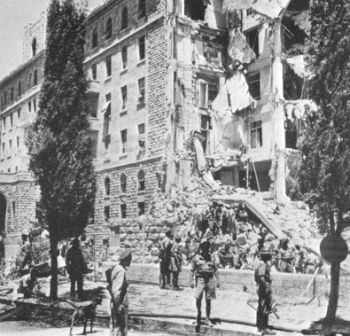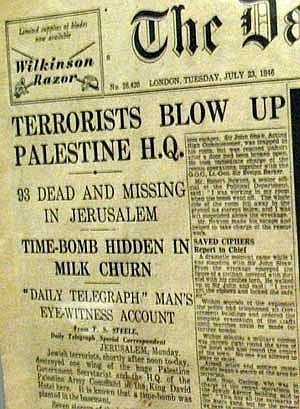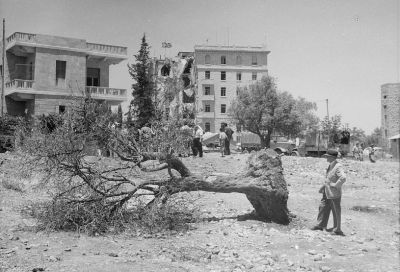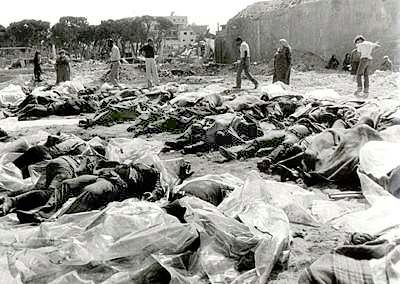
Publisher:
Bonnie King
CONTACT:
Newsroom@Salem-news.com
Advertising:
Adsales@Salem-news.com

~Truth~
~Justice~
~Peace~
TJP
Jul-24-2011 17:00


 TweetFollow @OregonNews
TweetFollow @OregonNews
The King David Hotel Blast that Shook the World
Bonnie King Salem-News.comThis grand hotel in Jerusalem is a constant reminder of the best and worst in humanity.
 King David Hotel after the bombing, July 22, 1946. |
(SALEM, Ore.) - 65 years ago, The King David Hotel in Jerusalem was blown up and nearly 100 people killed by Euro-Zionist-Immigrant-Terrorists.
This is not a case of "they've been fighting there for thousands of years", as is so often the easy cliche for those too distracted to comprehend the set up to the event.
No. This was a case of pure, unadulterated, strategic mal-intent by an organized body.
The King David Hotel was a hub of activity then as it is today. A five-star hotel, it was also the site of the British central offices. The southern wing of the hotel housed British administrative and military headquarters, but many heads of state and celebrities were known to take up residence at the famous hotel in short and long term capacities.
A beautiful structure created "to evoke by reminiscence the ancient Semitic style and the ambiance of the glorious period of King David", the hotel was built in 1931 with locally quarried pink limestone, possibly from the nearby Palestinian village of Deir Yassin. It is located on Julian's Way, which is King David Street today, overlooking Mount Zion, and the Old City of Jerusalem.
Tensions had been more than strained for many years between the British and the ever-growing Jewish populous that was incensed that there was an immigration limit and believed in an entitlement to the land regardless of who stood in their way.
In the lead up to this time period, there had been plenty of misguidance and broken promises made to the Arab community as a whole, creating a unstable foundation for peace.
Turkey sided with Germany during WWI, and they also controlled Jerusalem. The British believed that securing the Holy City was necessary to win the war, so they sent British Army officer T.E. Lawrence (Lawrence of Arabia) as liaison to convince the Palestinian-Arabs to help the British troops defeat the Turks in Jerusalem, and in turn, the Arab world would be granted autonomy from Europe and they would be allowed to live in peace. For hundreds of years prior to World War I, the area was administered and viewed locally as one entity, but that all changed in the twentieth century.
Shortly after securing Jerusalem, a document known as the Balfour Declaration undermined all of the promises Great Britain made to the Arabs through Lt. Col. Lawrence.
The British officially ruled in the southern part of Ottoman Syria (including modern Syria, Lebanon, Jordan, Palestine, Israel) from 1923–1948. With the League of Nations' consent on 16 September 1922, the Mandate territory was divided into two administrative areas, Palestine, under direct British rule, and autonomous Transjordan, under the rule of the Hashemite family, from what is Saudi Arabia today.
The preamble of the mandate declared:
Whereas the Principal Allied Powers have also agreed that the Mandatory should be responsible for putting into effect the declaration originally made on November 2nd, 1917, by the Government of His Britannic Majesty, and adopted by the said Powers, in favour of the establishment in Palestine of a national home for the Jewish people, it being clearly understood that nothing should be done which might prejudice the civil and religious rights of existing non-Jewish communities in Palestine, or the rights and political status enjoyed by Jews in any other country.
So while it was mandated that civil rights be upheld for all, by all, it was not agreed to by all. Of course there were a great many good and kind Jewish people with the best intentions, living side by side with Arab-Palestinians during this period- but not nearly enough.
Many of the Jewish people in Palestine did not want to rely on the British, and believed that the only answer to their security was their own security force, and there have been countless examples that could be made to support that. However, they were more often than not, the aggressor.

The underground group Irgun was a branch of the main Jewish para-military group in Palestine, Haganah. On November 14, 1937, the "policy of restraint" ended when Irgun changed its policy to "active defense", and violence increased exponentially.
From then on, more intense operations took place, more retaliation killings of Arab-Palestinians and British- too many to list but suffice it to say that Irgun's targets were not limited to any particular group- just those that opposed their belief system.
In 1946, just following the end of WWII, British relations with the Jewish authorities worsened.
On June 17, the Haganah attacked the bridges connecting Palestine with its neighbors, destroying 10 of the 11 bridges. These events were certainly a factor in the lead up to the British's "Operation Agatha", planned carefully and in great secrecy, which began in the early hours of Saturday, June 29, 1946.
For two weeks a curfew was imposed throughout the country and seventeen thousand British troops led a dragnet, searching for all Jews suspected of anti-British activities. They raided all Jewish homes, businesses, and synagogues.
The British troops confiscated a vast amount of intelligence information including cables, which clearly showed the role of leadership in the United Resistance, the umbrella group for Jewish Resistance movements between 1945 and 1946.
They also discovered the text of Kol Yisrael broadcasts (the Haganah's underground radio station), which said that everything possible would be done "to foil the transfer of British bases to Palestine and to prevent their establishment in Palestine".
The King David Hotel was where the highly sensitive documents were taken after the raids.
About 2,700 people were arrested throughout the country and taken to the Rafiah internment camp, but the sweep did not capture any of the major underground commanders. The Jews called the incident “Black Sabbath”. None of the people were held long, with the last of them released two months later.
Soon after, the Haganah command convened to discuss retaliation. They decided that the armed struggle against the British had to be continued in order to prove to the world that regardless of mass arrests, the British had not paralyzed the United Resistance.
They came up with a three-part plan.
1) Raid the Bat Galim army camp (for weapons)
2) Blow up of the King David Hotel (destruction of documents)
3) Blow up the David Brothers building
Irgun got the King David Hotel job. Lehi was to blow up the David Brothers building, but because of coordination problems, canceled its plan.
Irgunists planted the bomb in the basement of the main building of the hotel, under the wing which housed the Mandate Secretariat and a few offices of the British military headquarters.
Surprisingly, there were warnings of the impending blast called in to the hotel by telephone, but the hotel staff ignored them.
 The King David Hotel after the attack |
There had been another bomb hoax call at the hotel earlier that day. The hotel had carried out a search, and found nothing. They received bomb threats regularly, so perhaps they believed there was no reason to believe this threat was the real thing.
A Palestine Post telephone operator also received a warning call, and alerted the hotel. It was at that point that the hotel manager was notified of the threat. It is said that he then made a call to an unknown British officer minutes before the explosion, but no evacuation was ordered.
There was a lot of controversy surrounding the warning calls, as the British denied it for decades. In 1979, a member of the British parliament introduced evidence that the Irgun had indeed issued the warning, with testimony of a British officer who heard other officers in the King David Hotel bar joking about a Zionist threat to the headquarters. The officer who overheard the conversation immediately left the hotel and survived.
The huge explosion went off at 12:37 p.m., collapsing the entire western half of the southern wing of the hotel, all seven stories. The bomb shook Jerusalem for miles.
Apparently the staff of the government secretariat and the military command had remained in their rooms, whether they knew about the threat or not, there was no evacuation. A large number of victims were found trapped in the debris over the next week.
91 people were killed and 46 were injured. They were of various nationalities, ages, sexes: 28 Britons, 41 Arabs, 17 Jews and 5 others. Some were killed or injured on the road outside the hotel and in adjacent buildings.
There is some irony in that some of those killed were British soldiers who fought the Nazis in WWII, and likely helped liberate imprisoned Jews from concentration camps.
But that meant nothing to Irgun, the militant right-wing Zionist organization was completely one-minded in putting the Brits out of Palestine at all cost.
Even the 17 Jews killed by their hands only incited this response, "We mourn the Jewish victims; they too are the tragic victims of the tragic and noble Hebrew war of liberation."
The Irgun wasn't known for their compassionate nature.
Formed in 1931, Irgun broke away from the mainstream Jewish militia, the Haganah, mostly because they clashed on using violence.
The Irgun is also referred to as Etzel, an acronym of the Hebrew initials, or by the abbreviation IZL. The Irgun was a political predecessor to Israel's right-wing Herut (Freedom) party, which led to the present day Likud party. Likud has led or been part of most Israeli governments since 1977, and does today.
In the beginning, the Irgun and the Haganah generally maintained a policy of restraint, which created conflict within itself. The intangible thread of anger could not be dissuaded.
Most of Irgun's members were people who joined the organization's command and carried out various operations largely in opposition to British law, not a full-time effort for but a handful.
 Deir Yassin massacre |
The British increased their efforts against the Irgun and on August 31, 1939, the British police arrested members meeting in the Irgun headquarters. The next day, September 1, 1939, World War II broke out. Suddenly, political priorities took a turn.
After Irgun's leader Jabotinsky's death in 1940, ties were formed between the Irgun and the New Zionist Organization. These ties were broken in 1944 when the Irgun declared war on the British government.
The British and Palestinian-Arab peoples were not alone in their harassment by Irgun and the paramilitary mentality. Jews were threatened by the hard-liners as well.
The New York Times published a letter in 1948 signed by a number of prominent Jewish figures including Albert Einstein which described Irgun as a "a terrorist, right-wing, chauvinist organization in Palestine".
The letter said that Irgun "inaugurated a reign of terror in the Palestine Jewish community. Teachers were beaten up for speaking against them, adults were shot for not letting their children join them. By gangster methods, beatings, window-smashing, and widespread robberies, the terrorists intimidated the population and exacted a heavy tribute."
The bombing of the King David Hotel was the deadliest act directed at the British during the Mandate era, and one of the two best known Irgun operations.
The other is the Deir Yassin massacre on April 9, 1948, where at least 107 villagers were killed, including women and children, and in addition, one Irgun fighter testified that Irgun and Lehi men had killed 80 prisoners after the fighting was over. As it was, there was no place for them to create an internment camp for POW's so it was a choice between letting them go, and killing them.
It is important to note that the killing in the village only stopped because a crowd of people from the neighboring village Givat Shaul, all ultra-orthodox Jews, physically came into Deir Yassin and insisted it end, proclaiming the two villages to have had a peace-pact.
The terrorists were proud of this massacre and publicized it widely. They even marched prisoners through the streets of Jerusalem. Most Jewish organizations were horrified, as was the rest of the world, but it was too late for Deir Yassin.
On May 14, 1948 the establishment of the State of Israel was proclaimed. The next months were tumultuous, with power struggles costing many lives. In September, following the assassination of UN Envoy for Peace Folke Bernadotte, the Irgun and Lehi collapsed and integrated into the IDF (Israeli Defense Force).
Though it was not the "last straw", the bombing of The King David Hotel impacted the British, and it wasn't long until their colonization of Palestine came to an end, leaving it to the new Israelis with their many factions of Zionist philosophy, and to the longtime residents, the indigenous Arab-Palestinians. As we know, the story does not stop there.
Today The King David Hotel is a shining example of the splendor and beauty Palestine avails. It is a regular stop for royalty and dignitaries. However, there is a sense of grief that lingers, and perhaps trepidation. That is the same tremor of grief that has seeped into all of Palestine through daily fear and threat of violence. Outside the hotel it is much more difficult to see the illusion of peace.
Though aspects of the politics seventy plus years ago have changed, too much has stayed the same.
Still there is inequality throughout the region, still there is violence and a lack of justice. Still the mask of religion clouds common sense and humanity.
Still, the people of Palestine are imprisoned within their own lands and given little hope. Still, the Israeli fighters rationalize murderous behavior based on their selfish need for more, always more with the message to others of "Leave or Die".
And, still, the world cries out for peace in the Holy land.
_________________________________
 Publisher Bonnie King has been with Salem-News.com since August '04. Bonnie has a wide ranging media background and in her career she has served in a number of positions in the broadcast industry; TV Production Manager at KVWB (Las Vegas WB) and Producer/Director for the TV series "Hot Wheels in Las Vegas", TV Promotion Director for KYMA (NBC), and KFBT (Ind.), Asst. Marketing Director (SUPERSHOPPER MAGAZINE), Director/Co-Host (Coast Entertainment Show), Radio Promotion Director (KBCH/KCRF), and NIE/Circulation Sales Manager (STATESMAN JOURNAL NEWSPAPER). Bonnie has a depth of understanding that reaches further than just behind the scenes, and that thoroughness is demonstrated in the perseverance to correctly present each story with the wit and wisdom necessary to compel and captivate viewers.
Publisher Bonnie King has been with Salem-News.com since August '04. Bonnie has a wide ranging media background and in her career she has served in a number of positions in the broadcast industry; TV Production Manager at KVWB (Las Vegas WB) and Producer/Director for the TV series "Hot Wheels in Las Vegas", TV Promotion Director for KYMA (NBC), and KFBT (Ind.), Asst. Marketing Director (SUPERSHOPPER MAGAZINE), Director/Co-Host (Coast Entertainment Show), Radio Promotion Director (KBCH/KCRF), and NIE/Circulation Sales Manager (STATESMAN JOURNAL NEWSPAPER). Bonnie has a depth of understanding that reaches further than just behind the scenes, and that thoroughness is demonstrated in the perseverance to correctly present each story with the wit and wisdom necessary to compel and captivate viewers.
View articles written by Bonnie King
If you liked this article, please consider making a donation to Salem-News.com by clicking on the PayPal link on our front page (right side). Thank you!
Articles for July 23, 2011 | Articles for July 24, 2011 | Articles for July 25, 2011
Quick Links
DINING
Willamette UniversityGoudy Commons Cafe
Dine on the Queen
Willamette Queen Sternwheeler
MUST SEE SALEM
Oregon Capitol ToursCapitol History Gateway
Willamette River Ride
Willamette Queen Sternwheeler
Historic Home Tours:
Deepwood Museum
The Bush House
Gaiety Hollow Garden
AUCTIONS - APPRAISALS
Auction Masters & AppraisalsCONSTRUCTION SERVICES
Roofing and ContractingSheridan, Ore.
ONLINE SHOPPING
Special Occasion DressesAdvertise with Salem-News
Contact:AdSales@Salem-News.com

googlec507860f6901db00.html



Terms of Service | Privacy Policy
All comments and messages are approved by people and self promotional links or unacceptable comments are denied.
Chris Ranmore August 2, 2014 7:48 am (Pacific time)
Sadly, a state created through violence and mass immigration will never live in peace - you only have to look as Northern Ireland to see the centuries of conflict that lie ahead.
Michel Hervé Bertaux-Navoiseau July 26, 2014 1:03 am (Pacific time)
Na-Zionism still the same!
Ebraham Mozz July 26, 2011 5:21 am (Pacific time)
Now why didn't I learn about this in history class again? Thanks for an extremely informative report.
[Return to Top]©2025 Salem-News.com. All opinions expressed in this article are those of the author and do not necessarily reflect those of Salem-News.com.